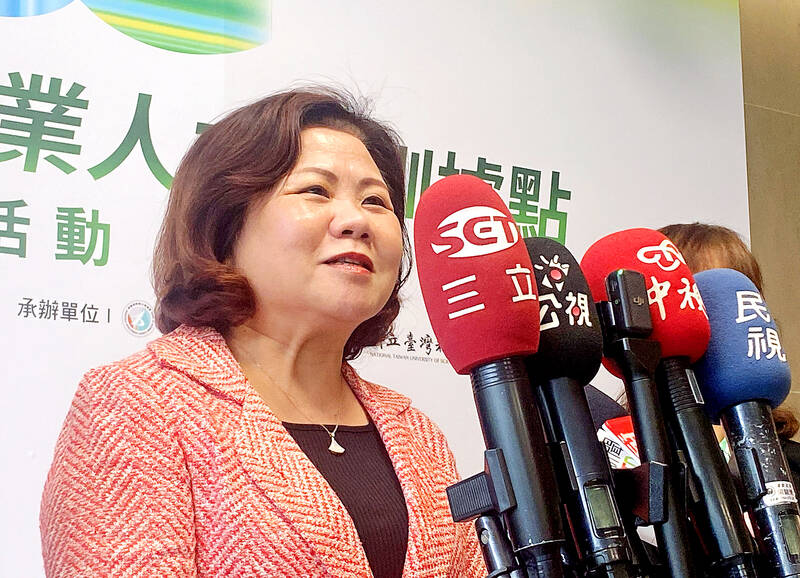Most of the participants in a Ministry of Labor meeting on Thursday discussing the recruitment of Indian migrant workers to alleviate Taiwan’s labor shortage have agreed that the manufacturing sector should be the first industry to start recruiting.
Migrant worker groups, employer representatives, labor broker associations and experts from Taiwan and India attended the meeting to discuss industries suitable for recruitment, the number of migrant workers to be recruited and the recruitment methods for a small-scale trial.
In February, Taiwan and India signed a memorandum of understanding to bring in Indian migrant workers as Taiwan is facing a shortage of labor in areas such as manufacturing, construction and agriculture.

Photo: CNA
Su Yu-kuo (蘇裕國), head of the Workforce Development Agency’s Cross-Border Workforce Affairs Center, said that a consensus was reached for the manufacturing industry to be the first to recruit Indian workers.
Suggestions were also made to let Taiwanese businesses with factories or operation sites in India be the first in the manufacturing industry to recruit Indian workers, Su said.
Regarding the number of migrant workers to be recruited, most participants thought it would be better to decide this at a later stage, as it was more important to first identify the industries that would be recruiting, he said.
Migrant worker groups suggested using direct recruitment, without going through brokers, to reduce controversies and disputes, he added.
Brokers in Taiwan and migrants’ countries have been known to charge high fees, which put workers in debt for at least their first year of employment, he said.
At the same time, experts and employer groups advocated for a dual approach involving direct hiring and brokerage systems.
They proposed the careful selection of brokerage firms to avoid problems such as migrant workers being charged hefty job placement fees and monthly service fees.
Indian experts at the meeting suggested that there should be further discussions with the Indian government to work out details for direct recruitment, should it become the main way of bringing in Indian migrant workers, Su said.
Further meetings would be held to address additional issues related to the recruitment of Indian migrant workers, he said.
Following the discussions, opinions and suggestions would be conveyed to the Indian government, he said.

When an apartment comes up for rent in Germany’s big cities, hundreds of prospective tenants often queue down the street to view it, but the acute shortage of affordable housing is getting scant attention ahead of today’s snap general election. “Housing is one of the main problems for people, but nobody talks about it, nobody takes it seriously,” said Andreas Ibel, president of Build Europe, an association representing housing developers. Migration and the sluggish economy top the list of voters’ concerns, but analysts say housing policy fails to break through as returns on investment take time to register, making the

‘SILVER LINING’: Although the news caused TSMC to fall on the local market, an analyst said that as tariffs are not set to go into effect until April, there is still time for negotiations US President Donald Trump on Tuesday said that he would likely impose tariffs on semiconductor, automobile and pharmaceutical imports of about 25 percent, with an announcement coming as soon as April 2 in a move that would represent a dramatic widening of the US leader’s trade war. “I probably will tell you that on April 2, but it’ll be in the neighborhood of 25 percent,” Trump told reporters at his Mar-a-Lago club when asked about his plan for auto tariffs. Asked about similar levies on pharmaceutical drugs and semiconductors, the president said that “it’ll be 25 percent and higher, and it’ll

CHIP BOOM: Revenue for the semiconductor industry is set to reach US$1 trillion by 2032, opening up opportunities for the chip pacakging and testing company, it said ASE Technology Holding Co (日月光投控), the world’s largest provider of outsourced semiconductor assembly and test (OSAT) services, yesterday launched a new advanced manufacturing facility in Penang, Malaysia, aiming to meet growing demand for emerging technologies such as generative artificial intelligence (AI) applications. The US$300 million facility is a critical step in expanding ASE’s global footprint, offering an alternative for customers from the US, Europe, Japan, South Korea and China to assemble and test chips outside of Taiwan amid efforts to diversify supply chains. The plant, the company’s fifth in Malaysia, is part of a strategic expansion plan that would more than triple

Taiwanese artificial intelligence (AI) server makers are expected to make major investments in Texas in May after US President Donald Trump’s first 100 days in office and amid his rising tariff threats, Taiwan Electrical and Electronic Manufacturers’ Association (TEEMA, 台灣電子電機公會) chairman Richard Lee (李詩欽) said yesterday. The association led a delegation of seven AI server manufacturers to Washington, as well as the US states of California, Texas and New Mexico, to discuss land and tax issues, as Taiwanese firms speed up their production plans in the US with many of them seeing Texas as their top option for investment, Lee said. The